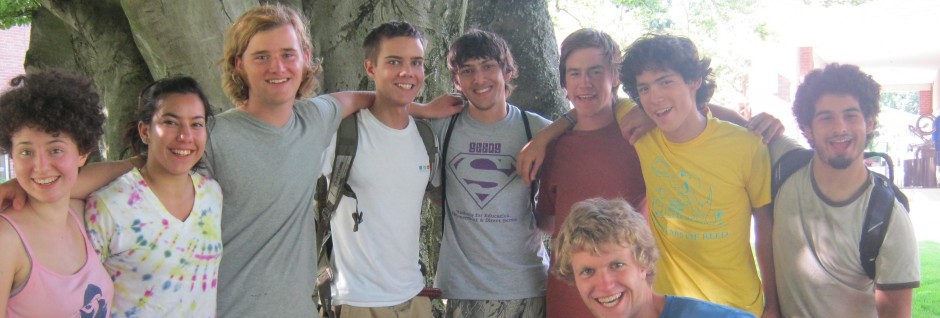Ever wonder about life after Reed? We chatted with former linguistics major and SEEDS Intern, Dean Schmeltz ‘14. For SEEDS Dean coordinated an on-campus tutoring program in partnership with the nonprofit Friends of the Children. After graduation he served for a year as an AmeriCorps member with Blue Engine in New York City. He now works at Portland nonprofit SCRAP as their Volunteer Coordinator, a job he found via Mac’s List. He also provides support to a retiree with memory difficulties, an opportunity he found via Reed’s Switchboard. We asked him a few questions (in bold):
Where do you live now & what are you doing? I’m living in SE Portland, and I have two part-time jobs. Primarily, I’m the Volunteer Coordinator at SCRAP PDX, and I also got a gig through Switchboard going to parks and museums with a retiree who has some memory difficulties. Besides that, I’ve been reconnecting with Portland by bike, cooking a lot more than I ever did at Reed, and watching a little too much TV. [Update: Found the SCRAP opportunity via Mac’s List.]
What have you been doing since you graduated? I graduated in 2014, and then spent an AmeriCorps year in NYC. I worked at a high school as an algebra teaching assistant, through a nonprofit called Blue Engine. I loved the experience, but I knew going in that I would move back to Portland after the year was up. I came back ready to apply for grad programs in educational linguistics (I was a ling major at Reed), and it looks like I’ll have the opportunity to get back into academia next year! In the meantime, working at SCRAP has been a great way to contribute to a Portland nonprofit that I’m a big fan of.
How did SEEDS prepare you for life beyond Reed? SEEDS has turned out to have an enormous impact on the direction of my life so far. First of all, I’m working as a Volunteer Coordinator right now because of the experience in volunteer management that I gained as a SEEDS Intern. However, I didn’t view my role at SEEDS through that lens at the time. I had taken over as the coordinator for a tutoring program I used to volunteer for, and the new position just happened to involve recruiting, interviewing, and supervising other volunteers. I was in it for the tutoring program itself, and my desire to explore that interest in one-on-one education was what led me to Blue Engine after graduation. I traveled across the country to get involved with this nonprofit, which improves the teacher-student ratio in low-income schools by bringing in teams of full-time teaching assistants. The class is still led by an experienced teacher, but with extra adults in the room it’s easier to split the class into small groups and keep close track of every student’s progress. So both of my jobs since graduating have been direct continuations of work I did through SEEDS.
How did Reed prepare you for life beyond Reed? Two years out from Reed, and I’m already looking forward to going back to school. The Reedie in me really wanted to incorporate my academic background in linguistics into a career in education, so when I discovered the field of educational linguistics I knew that was my next step. Reed gave me an uncommon perspective on everyday language use, and I’ll carry that with me wherever I go next. I also became a much more open minded person while at Reed, and for that I’m forever grateful to the students, staff, and faculty who I got to live, work, and study with.
What do you miss about your experiences at Reed? Besides being challenging at times, being a student at Reed was a lot of fun. I miss the geeky debauchery of HumPlay, playing saxophone with a jazz band every week, and printing t-shirts for Renn Fayre softball. The linguistics qual was the hardest test I’ve ever taken, but I miss struggling through it alongside all the other juniors, being revived by a gift of pizza from the ling seniors, and paying it forward the following year. Busy students somehow made a lot of great things happen on campus, and that’s what I miss about Reed.
What advice would you give to current Reed students? It can be hard to keep up at Reed, but try not to participate in “stress culture” by competitively overworking yourself. An extra hour of sleep might very well be more productive than an extra hour of work, though it will feel like a luxury. Take care of yourself, and take care of each other.
What do you envision yourself doing in the next 5 years? In five years I’ll hopefully have augmented my Reed linguistics training with some specialization in the field of education, and be in a position to support multilingual students and their teachers. Whether it’s through a nonprofit, or some professional development program, I’d love to work with educators on research-based ways to hold all students to high standards for written and spoken language, without sacrificing linguistic diversity in the classroom. I might be living in a new city, and I might even have a dog.
